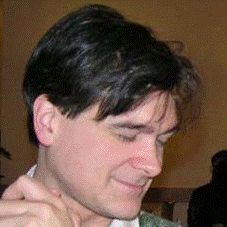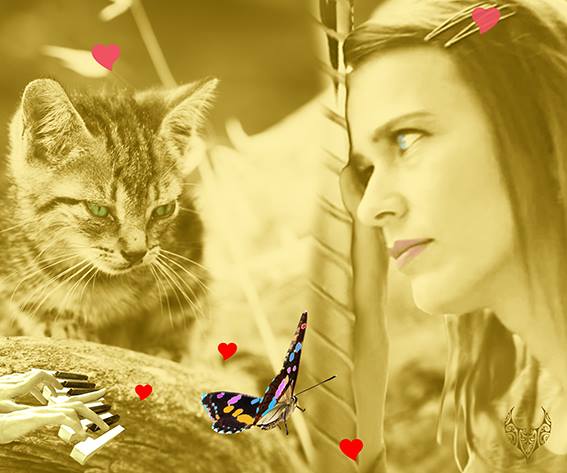Great to have you back!

1
Videos
About
I am a pianist and one time recorder player and I have some experience with the violin. I began composing even before I knew anything about composition and actually made a real composer smile at my efforts. None of these early works survive. As time went on and I changed from the contralto recorder to the piano, and began studying harmony and counterpoint, I took up composition in a more serious manner. I wrote several original works for the piano, as well as some arrangements of folk and popular songs. these survived and will be published shortly. I gave up composition because at the time, the early 90s, it seemed to me there was no place for my style of music. It was only two or three years ago that I began listening to contemporary music that is actually pleasant to hear. That was the moment I said to myself, "but I was writing music like that!"
Sheets
Interview
What does music mean to you personally?
I have always been surrounded by music and so-called "classical" music at that and it would be hard to imagine life without it. Music, dealing with the intangible, that is, sound, is the only truly abstract art and, apart from special effects, cannot express anything in the way painting or poetry can. Being so, the emotions that music exite are also intangible and, no matter how much we try to put them into words, we mostly fail. It is these wordless emotions which mean so much to me and which render me committed not only to music, but to absolute music.
Do you agree that music is all about fantasy?
No. Fantasy without structure is chaos. Fantasy can only take place when form is clear. As dissonance only has sense when combined with consonance, fantasy without reason is meaningless.
If you were not a professional musician, would would you have been?
Music, of course, is not one of the professions, but is an art from and I prefer the term full-time or concert musician. I myself am not a full-time musician, though I dedicate the greater part of my life to it, either writing, playing or listening to music. It is only recently I started to compose again, having abandoned it before because at that time there was no place for my style of music, which is not classical and yet not modern either. It is only in the first years of the XXI century that I became aware of composers who seem committed to writing music that is to be enjoyed and not "understood". Up to this day I do not know what there is to understand in music. Either one like it or one does not.
The classical music audience is getting old, are you worried about your future?
Is it? Why then are there so many children attending music school and so many young musicians around? Often, when I go to concerts, I see a majority of young people, principally when on the programme is early music.
What do you envision the role of classical music to be in the 21 century? Do you see that there is a transformation of this role?
Classical music is and should be unashamedly elitist. It always was and possibly always will be. This does not mean that only the wealthy or those who go to Eaton can appreciate it, quite the opposite! I have met construction-site labourers who listen to Beethoven and I have met millionaires who think Mozart is a chocolate manufacturer. I know musicians who have come from humbler backgrounds than mine and have gone much further that I. The appreciation of classical music is an achievement of a cultural elite and anyone willing to listen to it and enjoy it can become a member of this elite. Our mission, then, is to offer classical music without telling people you need to wear a tailcoat or a powdered wig to "understand" it.
When one says that classical music is searching for new ways or that classical music is getting a new face, what would come to your mind?
Classical music now, just as in former times, is a product of its times. We no longer recognise the peasant dances in Haydn's symphonies because, while the latter have survived, the former have tended to vanish. Closer to our times we have music influenced by Jazz which is classical music and not jazz. I believe this process can and should continue. Another aspect I like is that during concerts, principally of early music, the performers engage with their audience. I am not saying they wear torn trousers, do not shave for three days before coming or say naughty words. Audiences expect those on stage to be slightly different and better from them, so are not put off by a tailcoat or an evening gown if this tailcoat or evening gown explains to them what piece is being performed, why it is performed in this way and why it was written in the first place.
Do you think that the classical musician today needs to be more creative? Whats the role of creativity in the musical process for you?
As all art forms, classical music is limited and there are so many things which can be done. Take harmony, for example. Harmony is a physical phenomenon and physical phenomena cannot change over time. A seventh is dissonant. It was no more so in the days of Josquin des prés that it was in Stravinsky's. How can we be infinitely creative when our resources are limited? Writing a concerto for three neighing horses and kitchenware band might be creative, but is it enjoyable?
Do you think we musicians can do something to attract young generation into the classical music concerts? How will you proceed?
All we need to do is to show the younger generation that classical music is to be enjoyed and that applying the label, "classical" to virtually all music written in the last 700 years is silly. Popular music, which is only over 100 years old, seems to be divided into thousands of categories, while the rest in only classical. I am often described as only liking "classical", which is not quite correct, because I find Verdi just as uninteresting as the chap net door does who says classical music is boring. I bet most people would be delighted by the Surprise Symphony if just no one tells them it is classical music and must be understood.
Tell us about your creative process. Do you have your favorite piece (written by you) How did you start working on it?
I tend to start from something: an idea, a chord progression or even the need to have a piece to perform. I recently wrote a violin sonata because I have a young daughter who is learning the violin. I tend to concentrate a lot on a piece and will come back to it until I am entirely satisfied and not a single note can be added or changed. The result is I do not have as many works as I could have in my catalogue.
I like my piano (and piano trio) piece called (so far) Elfin Serenade. It is tonal without being traditional, it does not modulate but is not monotonous. It seems to be in A
major, but starts and ends in E major, but right at the start and at the end the c is natural. I cannot even decide what scale it is in!
We, Moving Classics TV, love the combination of classical music with different disciplines: music and painting, music and cinematography, music and digital art, music and poetry. What do you think about these combinations?
I am an adherent of absolute music. I find all these combinations tend to distract from the music itself. I even find opera distracting.
Can you give some advice for young people who want to discover classical music for themselves?
Listen to it, realising that you might not like everything you hear. Know that understanding how a work is composed does not mean you appreciate it. You might go wild about Schubert but dislike Tchaikovsky intensely. This does not mean you do not like classical music, but that you do not like certain composers. It means you have taste, good or bad, I do not know, but you have it. Just because one does not like stuffed peppers does not mean one does not like eating. Why should it be different with music?
Now it is a common practice in the media to talk that the classical music is getting into the consumption business, do you agree? We are speaking about the supply and demand rules and how to sell your “product” in your case your compositions. How do you see it?
As I said before, classical music is elitist, culturally elitist, but elitist anyway. Bach did not write the Brandenburg concerti to be played at the local beer garden (yes, I know about the Café Zimmermann, but those were subscription concerts offered to music lovers). There never was and never will be a mass demand for viola concerti or violin sonatas. If one believes that music should be subject to market laws, one is in for a hard time.
Do you have expectations what regards your listeners, your audience?
I have no preconceived ideas and I expect them to enjoy or not my music.
What projects are coming up? Do you experiment in your projects?
I am planning a string quartet. At times I might experiment, but the experiment should be such that it does not seem experimental, but relevant. Rossini experimented with hitting the violins with the bow in the overture to "Il Signor Bruschino" and that was so successful the technique is now widely accepted.
Copyrights © 2019 Moving Classics TV All Rights Reserved.
